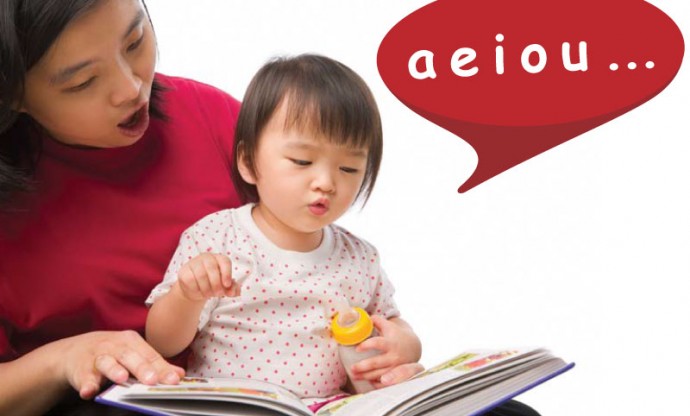If you want to give your toddler a social or educational advantage over his peers, a great way to do it is by giving him active exposure to language at an early age. You can achieve this by ensuring that you communicate with him as often as possible, and this includes talking and reading to him.
You can even start right from the moment of your baby’s birth. Don’t worry if he doesn’t understand what you are reading, as the important thing here is for you to spend quality time with him, talking with him. Studies have shown that even premature babies who are exposed to reading in the neonatal intensive care unit have better language skills as toddlers.
There are numerous benefits to be gained from reading to your toddler, namely:
- Picking up a large vocabulary of words.
- Learning how to use them.
- Facilitate a better understanding of phonics (a system of learning to read by correlating sounds with symbols).
- Associating the letters (and later on words) with the words you use.
- Gradually learning the letters of the alphabet.
There are so many other benefits that can be associated with reading to your toddler. Firstly, it helps reinforce his cognitive ability – his vocabulary is growing in leaps and bounds at this time. Reading helps to ‘feed’ his curiosity and hunger for learning about the alphabet, colours, shapes, weather, animals, seasons, or just about anything under the sun. Quick Tip: Pick a book with plenty of pictures of things that he can look at and name.
Reading is also a great bonding experience as it allows you to spend quality time with your toddler. This helps build a strong connection between the both of you, especially if you make the effort to ensure your reading sessions are very interactive – this allows your toddler to connect with you and reinforces that special bond.
Did you know?
Reading out loud to your toddler can be a big help in helping him to make the transition, from being a baby to a toddler. For instance, hearing stories about other toddlers who are facing the same problem as he is, can help him to manage his fears or frustrations, e.g. he may worry about monsters under his bed; a story about how another toddler handles this problem may help alleviate his fears.
It’s reading time!
Babies and toddlers normally love regularity as it makes them feel safe and comfortable. Try to ensure that your reading sessions happen at a similar time of day (daily if possible), for instance just before his naptime or bedtime.
If he is very active, try letting him sit on your lap or cuddle up with him. Most toddlers love being held closely as it makes them feel safe and comfy, thus enhancing your reading session with a happy and relaxed atmosphere.
Selecting a book
Always use age-appropriate books or material during your reading session with your toddler. You can start off with simple books for toddlers (most have typical titles such as “Baby’s first words”). Let him select which book he wants read to him. Don’t worry if he selects the same book every day for several weeks or even months as this is completely normal. Introduce new ones at the same time to show him that there is so much more to enjoy.
Books for toddlers normally have thick pages that are easily handled by toddlers whose hands are still not deft enough to handle a ‘proper’ book. In addition to this, ‘baby’ books are more durable so you can allow him to handle it himself without worrying that he might rip the pages out.
Catch his attention
Make sure you have allocated the time solely for your toddler’s reading session, so that means turning off the TV and leaving your smartphone out of reach. Take your time when reading and be as expressive as possible. Don’t be afraid to clown around by using different voices or playacting the roles of each character.
You can also us hand or finger puppets as props while you read to him. Try to get him to participate by reading, clapping or singing along with you. Have fun and replace some of the characters in the book with real life people, e.g. use your toddlers name in place of one of the characters.
Books with pictures are great as you can point them out and talk to him about them, e.g. ask him to name objects in illustrations or pictures. Before going to the next page, you can also ask him open-ended questions such as “What do you think the little boy is going to do with the box?” or “Tell me what you think will happen next?” This will encourage your toddler to think about the story you are reading and participate more actively in your reading sessions.
In addition to reading to him, you can also encourage his social and language skills by talking to him throughout the day. Other activities that help include singing to him, playing rhyming games, or even creating your own stories together.
No limits to access
Your reading sessions should not be the only time that your toddler has access to books. Make sure that his books are easily accessible to him at all times by leaving them in places where he can reach, e.g. in a separate basket for books beside his toys or on low shelves near his bed. You should also make it a habit to keep some books with you, e.g. in the car or when taking him to see his doctor.
Remember, the objective in reading with your toddler is to bond with him, so limit the time he spends on any kind of gadgets with screens, e.g. TV, video games, smartphones, tablets, etc. The American Academy of Paediatrics (AAP) recommends a ‘screen time’ of less than two hours a day for children below two years of age. Don’t fall into the trap of using a ‘digital nanny’ to replace you.
An educational contribution by Malaysian Paediatric Association.








Comments